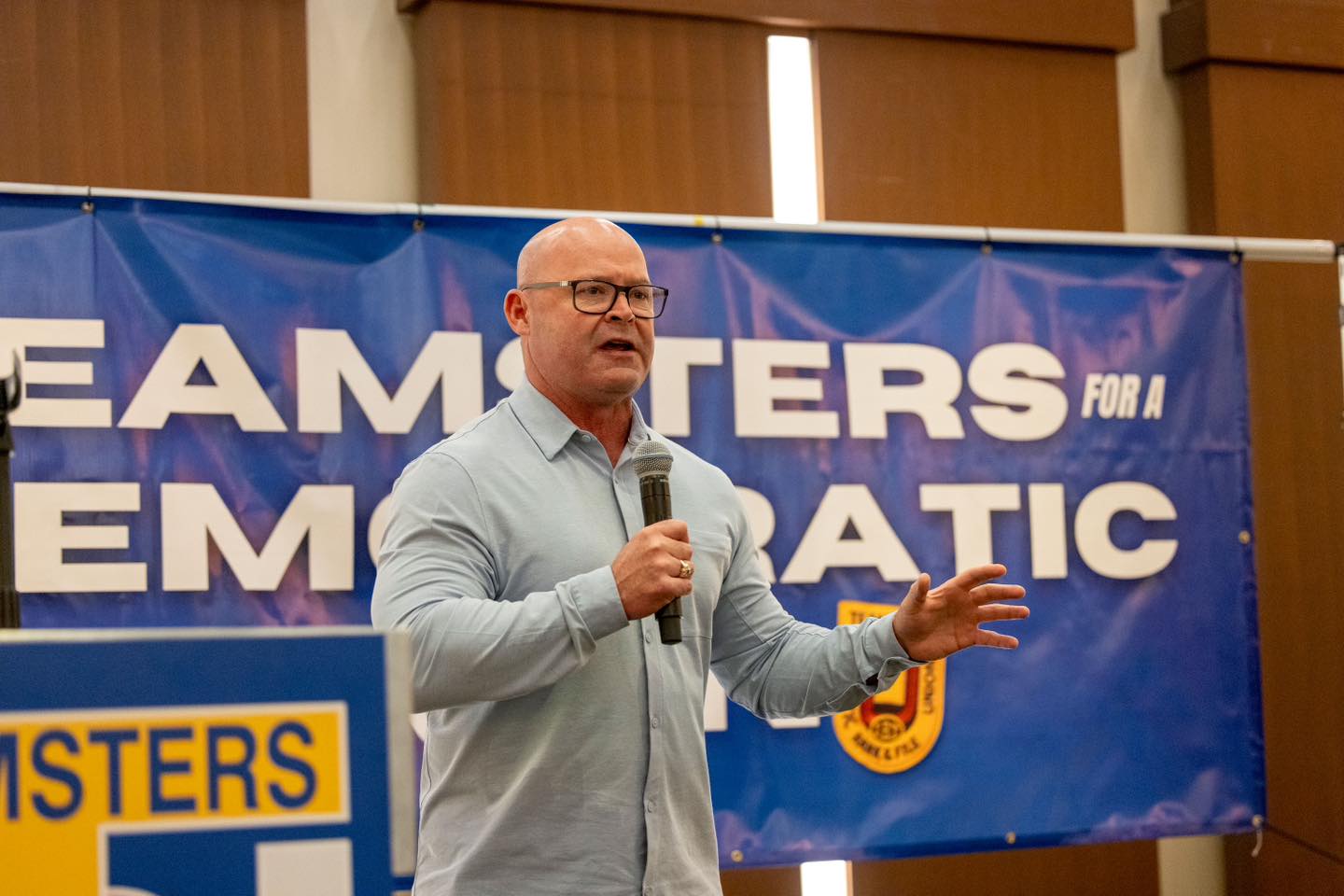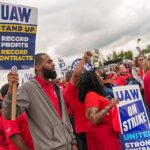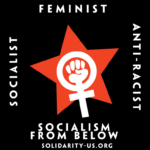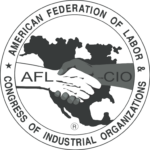Johanna Brenner interviews Barry Eidlin
Posted April 25, 2024
Dan La Botz published an article in New Politics, reprinted in the Solidarity Webzine, O’Brien, the Teamsters, TDU, and the Labor Left: A Controversy, summarizing many criticisms of Teamsters for a Democratic Union (TDU) and the role it has played in the International Brotherhood of Teamsters (IBT) since the election of a reform leadership under Sean O’Brien as President. Recently, Johanna Brenner interviewed Barry Eidlin, who has been closely following events in the IBT, to get his response to these critiques and his assessment of TDU today. Eidlin is an associate professor of sociology at McGill University and the author of Labor and the Class Idea in the United States and Canada.
The UPS Contract Fight
JB: Let’s begin with briefly revisiting the UPS contract fight and O’Brien’s agreement to settle without a strike. Some prominent left labor intellectuals were very critical of the IBT and disappointed that TDU did not push the O’Brien leadership further. Your assessment, published by Against the Current and Jacobin, argued that rank and file organizing and preparation led to a contract that made historic gains, that UPS militants were disappointed that a strike did not take place but also were not ready to organize a vote no campaign, because the contract gains were so substantial, that the contract opened up possibilities for continued organizing and base-building at UPS, and that TDU benefitted enormously from its work during the run-up to the contract and was positioned to expand its influence in the IBT. I highly recommend our readers going back to that article. Is there anything you’d like to add here?
BE: Yes, like many both inside and outside the union, I was personally disappointed that there was no 2023 UPS strike. But in the article I wrote for Against the Current and Jacobin, what I tried to do was to identify the factors that explained why there was no strike. We can disagree with the IBT’s logic, but it remains important to understand why a strike didn’t happen, rather than just denounce the fact that it didn’t happen.
The TDU Convention
JB: Another criticism concerns how TDU organizes its convention and whether rank and file members have the opportunity to propose and debate resolutions. This year, some left activists planned to propose a resolution for TDU to call on the IBT to “1) oppose the Biden administration’s proposal to send billions of dollars in military aid to Israel, and 2) call on the U.S. government to immediately issue a call for a ceasefire and condemn Israel’s bombing and ground invasion in Gaza.” They were not allowed to handout their literature during the convention.
BE: First, I think it is important, before talking about this specific issue, to discuss the purpose of the TDU Convention. And that is connected to the purpose of TDU and its goals. The TDU Convention is primarily an educational space for rank and filers—similar in a lot of ways to a Labor Notes conference. It goes for three days and almost all of that time is organized around workshops and educational presentations focused on the skills and tools for rank-and-file organizing: how to run a contract campaign, training shop stewards to do successful contract enforcement, how to organize your workplace, how to run a campaign against the boss, how to run for union office.
And the TDU convention reflects the type of organization TDU is. I think it’s important to be clear about this. Often, TDU gets likened to essentially a union within a union and people expect it to function like a union. A union brings together all these people who have widely diverging opinions, not only about the world, but also about how they understand what the union is supposed to be and do. They are just forced together because they work for the same employer, in the same industry. A union is therefore similar to a democratic polity; and the leadership of the union has an obligation to listen to all its members. But TDU is not a polity in that sense. It is more like a political party organized around a specific program and purpose—in this case, to organize the rank and file of the IBT in order to create a militant, democratic, fighting force of workers. You may disagree that this is too narrow; but it has been TDU’s focus for fifty years.
JB: I think that’s an interesting distinction. Still, I would argue that if TDU members who work say for a particular employer, like UPS, or in an industry, like warehousing, or in a region of the country think that TDU is missing opportunities for organizing, or making a strategic mistake and think they should be pushing in a different direction in some way, is there any route through which those activists can initiate a discussion, say at the Convention, and if not there, then where would a discussion like that take place? It’s not so much a question of being “democratic” in the sense of giving different perspectives a voice inside TDU; but certainly you want to have an action program that reflects the conditions on the ground. And if you have a top-down organization, where do those conversations take place?
BE: Well, yes of course. But if you look at how TDU operates on a day-to-day level, a lot of their activity is driven by what’s going on at the grassroots. For instance, some IBT members are angry that their union local isn’t doing what they think they should be doing. So, they reach out to TDU, and TDU sends some staffers or volunteer organizers from another local to go down there and help them organize. TDU is not a bunch of staff sitting in an office in Brooklyn and dictating policy from on high. It is really important to remember that TDU is laser-focused on organizing militancy and rank and file power at the local level. And the organization is mainly responding to initiatives taken by rank-and-file members.
TDU’s Influence Within the IBT
I think people often overestimate and underestimate TDU’s influence. They think that if TDU wanted to, they could push the IBT administration to transform itself. Not so. But it’s not completely false, because TDU has fundamentally influenced the shape and trajectory of the O’Brien administration. However, the way that happens is not by TDU calling upon the IBT leadership to do something. It’s basically the fact that TDU has the organization within the union that can mobilize members. And the O’Brien leadership understands that, and to some extent genuinely wants a militant, active membership base. So, TDU can use its position in the leadership coalition to lead by example on some issues. They propose ideas for certain campaigns or education programs, and if the IBT is hesitant to do it, they know that TDU has the capacity to do it themselves. That can sometimes break bureaucratic logjams in the union to make things happen.
More generally, there are certain norms of transparency and rank-and-file involvement now effective in the IBT that TDU has really helped shape. For example, at the Teamsters Convention in 2021, O’Brien adopted TDU’s platform around paying strike benefits on day one and ensuring rank and file representation on bargaining committees.
Another example is that TDU’s organizing has profoundly changed the IBT culture around official salaries. For much of its history, TDU has been trying to expose how officials are fleecing the union. Officials were double and triple dipping salaries, getting paid by their local and then by the joint council and the international, ending up with enormous payouts. Every year TDU combs through government forms (LM-2 forms) that all private sector unions have to file with the Office of Labor and Management Standards at the Department of Labor. And they calculate how much different officials are making and expose them. And that exposure campaign has been very effective. Whereas in the 1980s top Teamster officials routinely raked in what would amount to millions in today’s dollars, that kind of obscene compensation is largely a thing of the past.
Another area where TDU has considerable influence in the union now, compared to before O’Brien took over leadership, is with the IBT’s education and training programs, and to some extent in their organizing department. Where there’s new organizing to do, the IBT leadership knows that TDU leaders and activists are the ones who know how to do it.
JB: How does this translate into building TDU itself?
BE: TDU also organizes its own educational events, like regular webinars that hundreds, even thousands, of Teamsters attend, about contract enforcement, about grievance handling, and internal organizing. The TDU conventions are double the size of what they used to be. IBT members see TDU as this dynamic organization that is a source of information and tools on how to organize. And they’re getting involved based on that.
So, TDU is bringing in Teamster members from all kinds of places, including places where TDU never really had a presence. And that’s one of the benefits of their alliance with the O’Brien forces. They are getting access to all these parts of the union where they’ve just been shut out for decades. For instance, Local 135 in Indiana, where members organized to kick out the old guard and put a more TDU aligned leadership in place. And now that Local is organizing their butts off and really mobilizing for better contracts, extending picket lines across the country, centralizing bargaining, and generally building a stronger union.
This comes back to the point I was making earlier—that people overestimate TDU’s strength and want more from TDU than is realistic. TDU is expanding its reach, but does not have the depth or breadth of leadership that they would need to contest for leadership independently, outside a coalition. They have a few locals with militant leadership, but that’s not enough. The IBT is highly decentralized, much more so than many other national unions. Local unions are relatively small, and they have a lot of independence. So even if you control the top leadership, the leadership is limited in what can be done without more buy-in at the local level. And because there are so many locals, it isn’t sufficient to win office in some larger locals and catapult your organization into national office.
Now that TDU has a much greater reach inside the IBT, they have a real opportunity to grow their bench of leaders with a rank-and-file base.
Enforcing the UPS Contract
JB: One of the concerns that critics have mentioned about the UPS contract is that the company made commitments—like converting part-time into full-time jobs—that won’t be meaningful unless the union is able to enforce them and that enforcing them is going to be very difficult. Would you agree?
BE: Yes, a lot of the UPS agreement will be just paper unless the IBT organizes to enforce it. But that is almost invariably the case with any union contract. The difference is that you have TDU as an organization within the IBT that is making contract enforcement a priority, and TDU ‘s member training program has been focused specifically on it. They’ve really been going gangbusters there. And I should add that I am in touch with a lot of rank-and-file Teamsters, including DSA members, in UPS who were disappointed about not striking, and they report that the militant UPSers they work with are also critical of the O’Brien leadership. But that disappointment largely does not extend to TDU. They are excited about and engaged with the work that TDU is doing to support organizing and enforcement at UPS.
The TDU Convention
JB: So let’s return now to last year’s TDU Convention. You’ve made the case that TDU has a laser-focused mission and that the convention is more of an educational and organizing space than a place for debating and setting policy. Still, members certainly have the right to propose resolutions for discussion and vote during the session where the leadership presents its organizing plan for the year. Did the proposal for TDU to push the IBT to demand that the US support a ceasefire get discussed?
BE: Yes, it was put on the floor and was rejected. As I said, this is not the usual sort of question that TDU takes up. And my sense is that the people organizing for the resolution were not very prepared in terms of understanding how to get an issue debated and how to organize a base who would support discussing it. Again, remember, that this is a three-day convention with only one session for this kind of resolution. The convention committee did move things around to accommodate them and the resolution was presented and discussed at the closing session on Sunday.
TDU and the Rank & File Strategy
JB: That brings us back to the question, I think, of the decision that TDU has made about what sort of organization it will be. Unions certainly could play a powerful role in politicizing members, going well beyond “bread-and-butter” issues. TDU, as you say, has not seen that as its role. Why not?
BE: It would be very hard, I think, to imagine TDU surviving for as long as it has, if it was also taking upon itself, the role of advancing this broader political agenda. The decision to focus on building workers’ organizing capacities, militant commitments, and solidarity is part of a broader understanding of what the role of an organization like TDU is in relation to building a socialist movement based in the working class. The socialists who founded Labor Notes and TDU—and many other organizations like it in other unions and sectors in the 1970’s, understood these to be “intermediate organizations.” They would build consciousness and militancy and help to create the “sea within which socialists would swim,” and out of which they would recruit cadre and build the party.
So even though TDU has endured and had some success in terms of its specific mission, that second part of the equation hasn’t yet materialized, and I think that many leftists are very frustrated and looking for an alternative route to bring revolutionary politics into the class. I think that instead of trying to make TDU into something different, it is important to recognize what it is achieving right now. If the point of the rank-and-file strategy is to build a bigger sea for socialists to swim in, right now TDU is expanding that sea of a more militant, self-active working class, and changing the conditions for building a broader working-class movement on the ground.






Leave a Reply